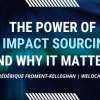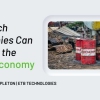Corporate social responsibility (CSR), also known as sustainability, may not solve world hunger but it can be beneficial to your organization while making a significant impact on society. While many organizations understand the value of CSR, the uninitiated tend to have a distorted view of it. Some believe it’s just greenwashing: donating heaps of money into popular causes or people sitting around a campfire singing Kumbaya, but that’s far from reality. In actuality, CSR can be leveraged to optimize a company’s business processes. So, to companies that are stuck on whether CSR is right for them, here are three reasons why you should embrace corporate social responsibility.
- Cost Savings – Cutting costs and saving money will never go out of style. Every day organizations try to identify opportunities to benefit their bottom lines, so why not leverage CSR as a strategy? Whether it’s utilizing resources efficiently, leveraging renewable power, allowing telecommuting, installing energy-efficient lights, recycling or using less packaging, practicing CSR can have real-world effects on your organization’s financial performance. For example, Google’s sustainability movement, “Google Green,” not only lowered costs but caused an overall drop in power requirements for its data centers by an average of 50 percent. These savings were redirected to other areas of the business or to investors. General Mills is another example. After installing energy monitoring meters on several pieces of equipment at its Covington, Georgia plant, the company saved $600,000. Think about the scalable impact this simple initiative can have across all sites and locations! CSR can not only improve the world but also result in quantifiable cost savings.
- Innovation – Through the lens of CSR, innovation is a huge benefit to a company and society. For example, because of Levi’s “Water<Less” campaign, the organization re-engineered its processes to reduce water usage during manufacturing and saved over 1 billion liters of water. Similarly, Unilever innovated new products, such as a hair conditioner that uses less water. Earlier this year, IKEA set goals to become a climate positive company. The Swedish brand cleaned up its operations by investing in more renewable energy and reducing its carbon footprint across its stores and factories globally. It was also able to innovate and introduce eco-friendly products that include solar-powered lanterns, reusable food storage bags, upcycled bins and more. By 2030, IKEA’s entire line of home goods will be recyclable or made of second-life materials!
- Brand Differentiation – Brands must generate trust and a meaningful engagement over time that touches the lives of consumers. In order to do this, Robert Wolcott, Co-Founder and Executive Director of the Kellogg Innovation Network and a Clinical Professor at the Kellogg School of Management, claims an organization must be truly authentic to compete for market share and withstand the test of time. In an era where consumers are no longer loyal to a brand, they remain loyal to the engagement experience that a particular brand offers. This is where CSR can be leveraged to differentiate your brand among others, specifically toward target consumers.
According to Goldman Sachs, millennials make up the largest cohort of consumers and are reshaping the way products are bought and sold, forcing companies to reevaluate the way they do business. The millennial generation prioritizes sustainability and is willing to pay extra for sustainable products in comparison to other groups. It only makes sense for organizations to capitalize on this trend and set themselves apart from competitors. As an example, let’s take a look at TOMS. For those of you unfamiliar with the brand, TOMS is a sustainable shoes and apparel store with a unique business model. Its “One for One” philosophy, developed by Blake Mycoskie, revolutionized the game of corporate social responsibility. The company promises to give a pair of shoes to a child in need for every purchase of a pair at TOMS. The success of this movement has led “One for One” to spread across the rest of the TOMS portfolio. This social entrepreneurship business model created a powerful emotional experience for its consumers, thus leading them to be more inclined to purchase shoes and apparel. It’s essentially a win-win situation. This simple philosophy created a successful $400 million company and it has given away more than 86 million pairs of new shoes for children in need.
These reasons only scrape the tip of the iceberg as to the benefits of CSR. All organizations can benefit by viewing their roadmaps through the lens of corporate social responsibility. Again, this isn’t to say that CSR is the solution to the world’s problems, but it certainly does start to move the needle toward an economy that is much closer to how we should operate in order to conserve Earth’s limited resources and help those who are less fortunate.
Region:









